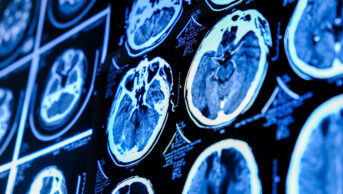For millions of people across the UK, migraine continues to be a debilitating disease. There is clear evidence that patients struggle to receive timely diagnosis with access to effective treatments varying across the UK.
It is estimated there were 33,000 hospital admissions for migraine in 2021/2022 with an economic cost of £4.4bn in lost work days. A sizeable patient cohort fail to fully benefit from traditional treatment options with a clear unmet need for more effective therapies.
In this learning episode of The PJ Pod, we look at the latest developments in migraine treatment where new classes of drugs are starting to provide additional options for patients and prescribers.
By the end of the episode, you will be able to:
- Understand the role of both injectable calcitonin gene-related peptide monoclonal antibodies and oral calcitonin gene-related peptide receptor antagonists, or ‘gepants’ in the treatment of migraine;
- Distinguish between the treatment recommendations for preventative and acute use;
- Appreciate the challenges faced by long-term migraine patients and the need for an individualised and holistic approach to management of their condition;
- Know what to expect as new migraine treatments are introduced to primary and secondary care settings.
Many thanks to Kerri Spalding, a migraine patient, advocate and fund raiser and Mathew Garrod, lead pharmacist for neurosciences and specialist pharmacist at University Hospital Southampton NHS Foundation Trust for their expertise and insights.
This programme is presented by Alex Clabburn, senior editor, research and learning, and was produced by Geoff Marsh.
Further resources
Learning articles from The Pharmaceutical Journal:
NICE guidance:
- Atogepant for preventing migraine;
- Rimegepant for preventing migraine;
- Rimegepant for treating migraine.
SIGN guidance:
Other resources:
- Cure For Migraine Disease — the personal blog and information page run by Kerri Spalding in support of the migraine patient community;
- Heading in the wrong direction: Challenges in migraine care and why people with migraine deserve better — a comprehensive report from the Migraine Trust summarising the challenges facing migraine patients with recommendations for improving standards and outcomes;
- National Neurosciences Advisory Group (NNAG) — optimal clinical pathway for adults: headache and facial pain;
- NHS Scotland National Headache Pathway — developed to aid the assessment, diagnosis and management of common primary headache disorders and give guidance on when to consider secondary headache disorders;
- NHS RightCare: headache and migraine toolkit;
- Society’s headache: the socioeconomic impact of migraine — a report from the Work Foundation summarising findings from a research study investigating prevalence and socioeconomic impact of migraine in the UK.
Want to hear more from The PJ Pod? Follow us on Spotify, Google Podcasts, Apple Podcasts or other popular podcast platforms to listen to our latest episodes.


